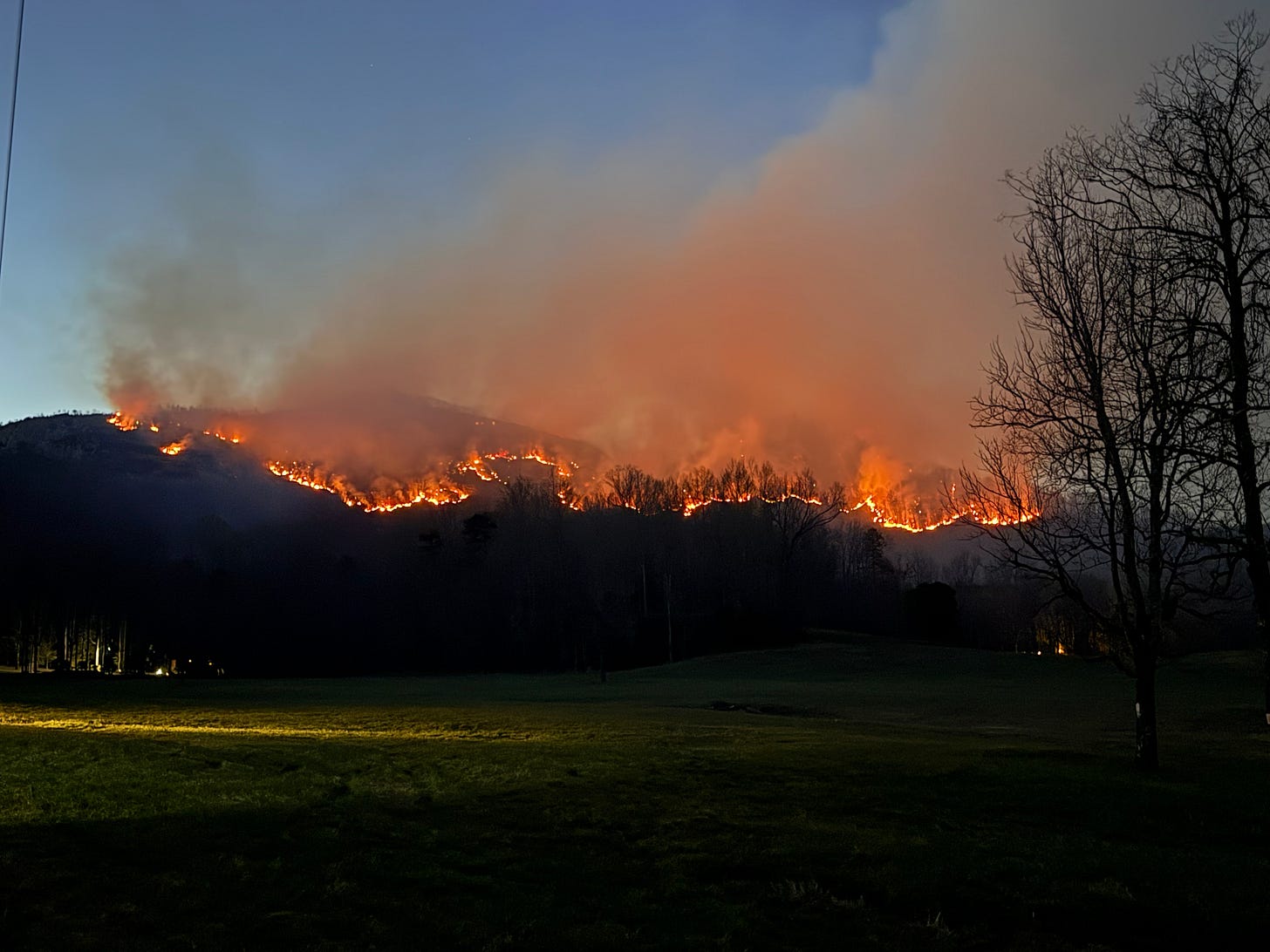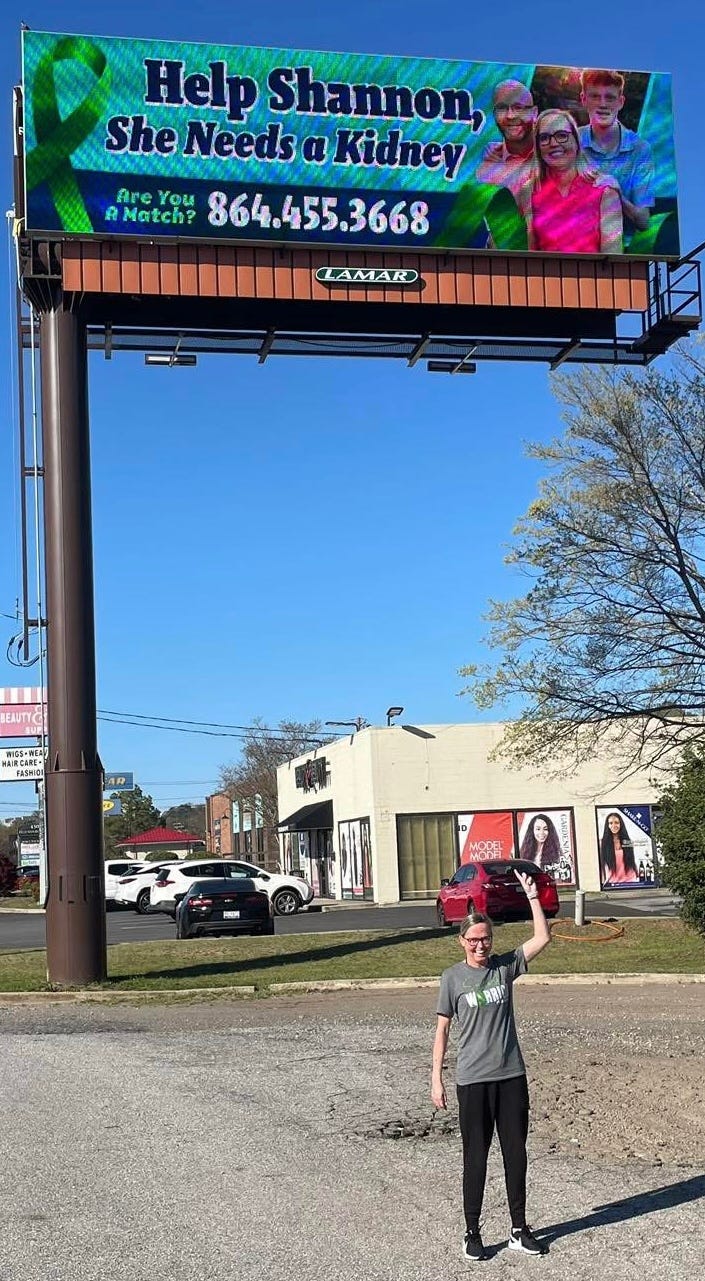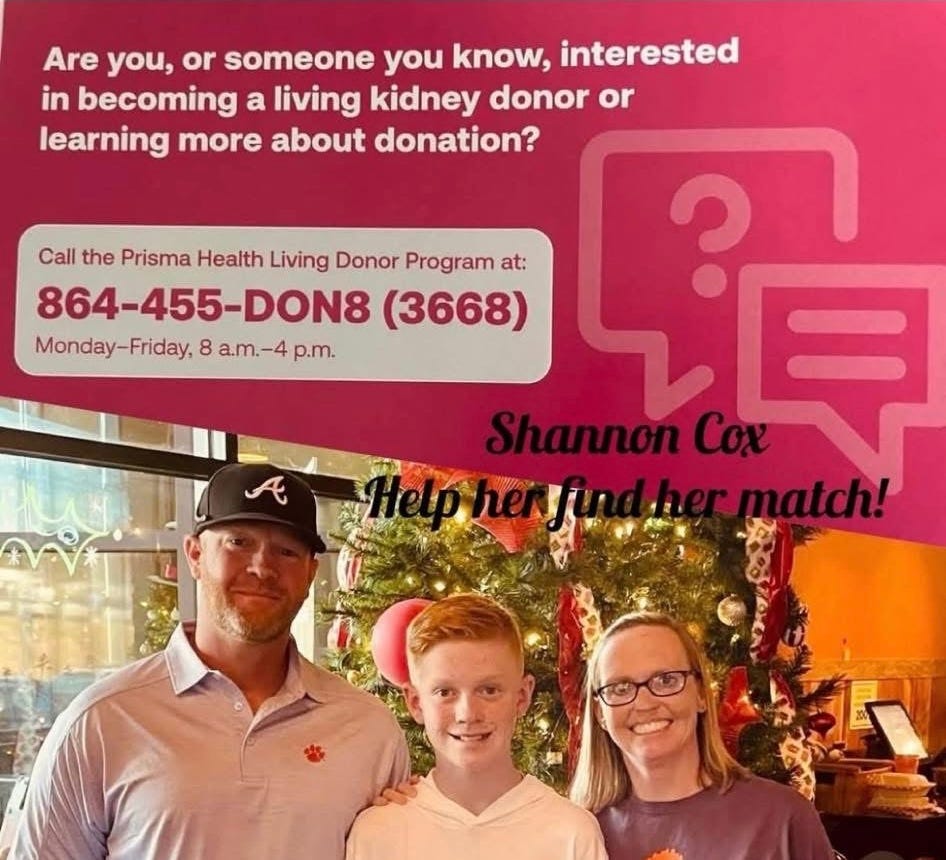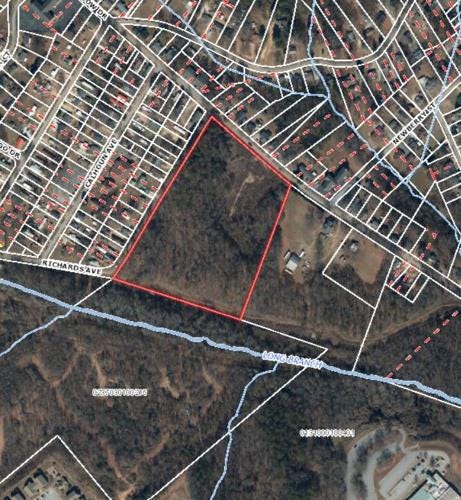Update on Table Rock Fires, Community Support, and Development in Greenville County
Chairman Blount’s Newsletter 3-23-25
Greenville County Council and Standing Committee Meetings: March 24 – March 28, 2025
Monday, March 24
3:30 PM – Public Safety Committee
• Location: 301 University Ridge, Greenville – Committee Meeting Room
• Livestream: Watch here
5:00 PM – Oversight Committee
• Location: 301 University Ridge, Greenville – Committee Meeting Room
• Livestream: Watch here
Tuesday, March 25
5:00 PM – Communications and Governmental Affairs Committee
• Location: 301 University Ridge, Greenville – Council Committee Room
• Livestream: Watch here
Wednesday, March 26
4:30 PM – Planning Commission
• Location: 301 University Ridge, Greenville – Committee Meeting Room
• Livestream: Watch here
Support documents related to the county council and standing committee agendas are available for review in the county council office or online at www.GreenvilleCounty.org
Table Rock State Park Fire: Greenville County’s Response & Ongoing Efforts
As of March 23, 2025, the wildfire at Table Rock State Park in Pickens County has grown to over 110 acres and remains uncontained. Due to high winds and dry conditions, the fire has the potential to spread further, prompting Governor Henry McMaster to declare a state of emergency and enforce a statewide burn ban to prevent additional fires.
While the fire is burning in Pickens County, Greenville County’s firefighters and emergency management teams have been actively assisting in suppression efforts while also ensuring Greenville County remains protected from any potential fire threats.
Timeline of Events & Greenville County’s Involvement
Friday, March 21: The fire was accidentally started by four teenage hikers at the summit of Table Rock Mountain. Pickens County Fire and Forestry officials began immediate suppression efforts.
Saturday, March 22: The state of emergency was declared, and voluntary evacuations were advised. Greenville County Emergency Management began coordinating assistance, ensuring additional resources were ready if needed.
Sunday, March 23: Greenville County fire crews and emergency teams have been working closely with Pickens County officials, helping to contain the fire and protect nearby communities.
Current Status & Precautions in Greenville County
While Pickens County remains the primary fire zone, high winds and dry conditions put parts of Greenville County at risk. To ensure public safety, officials urge all citizens to:
Follow the Statewide Burn Ban: No outdoor burning, including yard debris, campfires, or bonfires.
Remain Alert: High winds can spread embers miles beyond the fire zone. Be cautious and report any signs of fire immediately.
Stay Informed: Greenville County Emergency Management is closely monitoring conditions and will issue updates if the fire spreads toward our communities.
Greenville County Emergency Management: Always Ready to Answer the Call
Emergencies don’t wait for convenient timing, but Greenville County’s Emergency Management team and firefighters are always ready to step up—whether in our own county or to assist our neighbors in Pickens.
Last night, we witnessed firsthand how quickly and efficiently our emergency teams respond.
At 10 PM, I was informed that one of the fire departments actively fighting the blaze had run out of bottled water for their firefighters. Knowing that hydration is critical in these conditions, I sent a quick text to Greenville County Emergency Management, expecting a response in the morning.
Instead, less than a minute later, I received this reply:
“We have lots of water at Emergency Management leftover from Helene. We’ll facilitate getting it to the firefighters.”
Without hesitation, they were already working to get resources where they were needed most.
While the men and women on the front lines are battling the flames, our emergency response teams are making sure they have the supplies, coordination, and support needed to keep going. It’s a testament to the dedication of Greenville County’s emergency services, who are always prepared, not just for our county, but to support our neighbors in times of crisis.
A huge thank you to our Greenville County Emergency Management team and local fire departments for their rapid response and commitment to protecting both our county and assisting Pickens County in these efforts.
Greenville County Firefighters on the Front Lines
Our local firefighters are playing a critical role in containing the wildfire while ensuring that Greenville County remains protected. We want to recognize and thank the brave firefighters and emergency personnel working tirelessly in both counties, including:
🔥 Pickens County Emergency Services & Fire Departments
🔥 Greenville County Emergency Management
🔥 Greenville County Fire Departments
🔥 South Carolina Forestry Commission
🔥 The Nature Conservancy
🔥 USDA Forest Service
Your dedication, courage, and commitment do not go unnoticed. You are protecting lives, homes, and natural areas, and we are grateful for your service.
To all Greenville County residents: this fire is a reminder of how quickly disasters can escalate. Let’s do our part to prevent further wildfires by adhering to the burn ban, staying cautious, and supporting our first responders.
For live updates on the Table Rock fire and any potential risks to Greenville County, follow Greenville County Emergency Management and local news.
Together, we stand with our neighbors in Pickens County and support the brave men and women working to keep us all safe!
A Life-Saving Connection – and a New Call to Action for Shannon Cox
A few newsletters ago, I shared a story about a simple message on the side of a Jeep that read, “HUBBY NEEDS A KIDNEY.”
Read the story from the previous newsletter HERE
I am happy to report that through the collective power of community awareness and the kindness of countless individuals, Jeff found a donor. Thanks to the efforts of those who shared his story, spread the word, and supported his journey, Jeff has now undergone a successful kidney transplant and is currently on the path to recovery. This is proof of what we can accomplish when we come together to help those in need.
However, our work is far from over. Another member of our community, Shannon Cox, is now in urgent need of a kidney donor.
Shannon’s Story – A Life Turned Upside Down
Shannon Cox is a wife, mother, and third-grade teacher whose life was forever changed on August 31, 2024. I know this because Mrs. Cox is my daughter Brooklyn’s teacher and we have been keeping up with her journey ever since the first week of school when things seemed to take a turn for the worse. Despite the struggles she faced, she tried showing up to school for her kids until it simply wasn’t possible. What started as minor health issues quickly escalated into a life-threatening battle. After weeks of worsening symptoms, she was rushed to the hospital, where doctors diagnosed her with Granulomatosis with Polyangiitis (GPA)—a rare autoimmune disease that inflames blood vessels, leading to severe lung and kidney damage. This condition is so rare that it affects only 3 out of every 100,000 people.
By the time doctors identified the disease, Shannon’s kidneys had stopped functioning entirely. She was placed in the ICU, began dialysis, and faced numerous complications. Since her diagnosis, she has endured multiple hospitalizations, including a GI bleed from high-dose steroids and pulmonary edema due to high blood pressure from kidney failure.
Despite these struggles, Shannon remains determined to live life as fully as possible. She recently found moments of joy by attending the SEC Women’s Basketball Tournament with friends and watching her son Carter play basketball in Gatlinburg. These moments, she says, allow her to forget about being sick—if only for a little while.
How You Can Help
Shannon needs a kidney donor to survive. She is actively searching for a living donor and hoping for a match that will allow her to regain her health and independence. If you or someone you know is willing to be tested as a potential donor, please consider reaching out. Even if you aren’t a match, sharing her story could connect her with someone who is.
Additionally, Shannon’s family and friends are organizing fundraisers, like the upcoming golf tournament mentioned below, to support her medical expenses and ongoing care. More details on these efforts will be shared soon, and any support—whether financial or simply spreading the word—can make a significant impact.
This is more than just one person’s story—it is a call to action for our entire community. We saw the power of people coming together to save Jeff. Now, it’s time to do the same for Shannon. Let’s step up once again, share her story, and help find the donor who can give her the gift of life.
You can keep up with Shannon’s story HERE
Spotlight on Local Business: Upstate Pest Purge
In the heart of District 19, Upstate Pest Purge stands as a testament to the strength and dedication of our local businesses. This small, family-owned company offers both residential and commercial pest control services, ensuring that homes and businesses remain pest-free. With over 20 years of experience, they are licensed and insured, providing reliable and safe solutions tailored to individual needs. Their commitment to quality service and customer care earned them the “Best of SC 2024 Regional” award in their very first year of operation—a true reflection of their expertise and dedication. Whether addressing seasonal pest issues or long-term prevention, Upstate Pest Purge is a trusted name in our community.
Why Supporting Local Business Matters
Small businesses like Upstate Pest Purge are the backbone of our community. When we choose to support a local, family-owned company over a large corporation, we’re investing directly in the people who live, work, and give back to our area. These businesses create jobs, drive economic growth, and maintain the character that makes District 19 unique. The owners and operators of Upstate Pest Purge has been serving our community in some capacity for over two decades, demonstrating the kind of long-term commitment that deserves our support. By choosing local, we help ensure that businesses like this continue to thrive and serve our neighbors for years to come.
Learn more about Upstate Pest Purge at upstatepestpurge.com
Misconceptions About Development Approvals in Greenville County
When residents see headlines like “120 Townhomes Proposed in Greenville County”, many assume that the county has already approved the development and that construction is imminent. This is a common misconception.
Take, for example, a recent article from The Post and Courier Greenville detailing a proposed 120-townhome development across multiple locations in Taylors, Berea, and Piedmont. To the untrained eye, it may seem like these townhomes are a done deal, but in reality, this is just the beginning of a long approval process.
You can read the article here: Greenville County 120 Townhomes Proposal
The truth is, when news outlets report on a “proposed” development, it simply means that a developer has submitted an application—it does not mean that the county has approved the project. Every proposed rezoning or development must go through a multi-step review process, including public input and County Council approval, before any construction can begin.
I wanted to address this so that there is no confusion in our district or the County concerning any potential future development.
The Rezoning and Development Approval Process in Greenville County
If a developer wants to build something that does not conform to the current zoning of a property, they must apply for rezoning. This process ensures that developments align with the county’s long-term land use goals and community interests.
Step 1: Rezoning Application Submission
• Developers must submit a rezoning request to the Greenville County Zoning Administration.
• If the project involves a Planned Development (PD), Flexible Review District (FRD), Neighborhood Commercial (NC), or Planned Office District (POD), a pre-submittal meeting with county staff is required.
• Applications are due by noon on the designated deadline date.
Step 2: Public Hearing
• A public hearing is scheduled where county staff, the applicant, and the public can present their cases.
• The public has an opportunity to express concerns or support for the rezoning request.
• The county’s zoning staff provides an analysis based on the county’s comprehensive plan and land use policies.
Step 3: Planning Commission Review
• The Planning Commission reviews the request and provides a recommendation to either approve, deny, or modify the rezoning application.
• This recommendation is then sent to the Planning and Development Committee.
Step 4: Planning and Development Committee Review
• The committee evaluates the rezoning request based on the Planning Commission’s recommendation and public input.
• The committee then makes a formal recommendation to the County Council.
Step 5: County Council Decision (Three Readings)
• First Reading: The rezoning request is introduced and added to the public record.
• Second Reading: Council members discuss the request in detail and may request additional input.
• Third Reading & Final Vote: Council votes to approve or deny the rezoning.
Only after this third and final reading—typically months after the initial proposal—can the rezoning be officially approved. Without this approval, developers cannot move forward with their plans.
Why This Matters to Citizens
Understanding this process helps citizens know when and how they can voice their opinions on developments in their communities. If you see a proposed project in the news and have concerns or questions, here’s what you can do:
• Attend public hearings to provide input.
• Reach out to County Council members to express support or concerns.
• Stay informed by checking Greenville County’s website for upcoming zoning cases and development proposals.
Reassessment Year: What It Means for Greenville County’s Budget
2025 is a reassessment year for Greenville County, meaning that property values will be updated to reflect changes in market conditions. While many homeowners may see an increase in their property values, it is important to understand that this does not automatically translate into increased revenue for the County.
County Council’s Commitment to Fiscal Responsibility
Greenville County Council understands the mandate set before us when it comes to the county budget. We are committed to not raising taxes and, beyond that, working through the budget to find ways to reduce the tax burden as much as possible. We recognize the financial pressures on residents and businesses, and we are dedicated to ensuring that county government remains fiscally responsible while continuing to provide essential services.
How South Carolina Law Limits Revenue Growth from Reassessments
Under Act 388 of 2006, South Carolina law includes strict provisions that prevent reassessment from serving as a mechanism for local governments to collect more tax revenue. When property values rise due to reassessment, state law requires counties to adjust millage rates downward to ensure that the total tax revenue collected remains the same as the prior year—unless County Council votes to raise taxes separately, within legal limits.
This rollback millage requirement prevents automatic tax increases caused by reassessment. While individual property owners may see their taxes change based on updated values, the total amount of tax revenue that Greenville County receives does not increase unless Council explicitly votes to do so.
The Real Impact of Reassessment
1. No Windfall for the County – Reassessment does not create new revenue for the county government. Instead, it redistributes the existing tax burden among property owners based on updated property values.
2. Some Pay More, Others Pay Less – If your property value increases more than the county average, your tax bill may rise. If your property value increases less than the county average, or remains unchanged, your tax bill may stay the same or even decrease.
3. Council’s Role in Tax Increases – If the County needs additional revenue, it must go through a separate process of increasing millage rates beyond the rollback rate, which requires a public vote by County Council. However, Council remains committed to keeping taxes low and actively looking for ways to reduce the financial burden on taxpayers.
Holding the Line on Taxes
Understanding this process is crucial as discussions around taxes and budgets continue. Some may claim that property reassessment is a backdoor tax increase, but the law explicitly prevents this unless elected officials choose to raise taxes separately. Any claims suggesting reassessment alone will generate more revenue for the County are misleading.
As we move through the 2025 budget process, Greenville County Council remains committed to protecting taxpayers, ensuring financial accountability, and exploring ways to lower tax burdens wherever possible. This reassessment year is an opportunity for property owners to better understand how local taxes work and to hold elected officials accountable for the choices that truly impact their tax bills.
Chairman’s Corner: Update on Greater Greenville Sanitation
In recent weeks, our community has been engaged in a critical discussion regarding the future of Greater Greenville Sanitation District (GGSD). Two proposed bills, House Bill 4002 and House Bill 4003, aim to dissolve or significantly alter the operations of GGSD. As Chairman of the Greenville County Council and the representative for District 19, I feel compelled to address these developments and their potential impact on our community.
Understanding the Proposed Legislation
• House Bill 4002 proposes dissolving GGSD if it operates outside its designated service area, mandating the cessation of all waste collection services by December 31, 2025. The bill requires GGSD to notify property owners, assist employees in finding new employment, liquidate assets, and settle all debts.
• House Bill 4003 seeks to restrict GGSD’s operations within its geographic boundaries and mandates a shift from property tax millage to a sanitation fee set by the County Council. It also requires the retirement of all general obligation bonds, limits future bond issuance to revenue bonds only, and prohibits GGSD from operating a transfer station. These changes would take effect on January 1, 2026.
Concerns Over Politicalization and Legislative Tactics
It is deeply concerning that some have attempted to turn this into a partisan issue, framing it as a Democrat vs. Republican debate. I caution against this approach because, at its core, this is not a political issue—it’s a matter of ensuring that our residents continue to receive essential sanitation services.
I fully support GGSD continuing to operate in District 19 as they always have. For us, there are no party lines in this conversation. It is reckless to take something as vital as sanitation services and turn it into a political football.
Furthermore, certain legislators have admitted that these bills were introduced not as a real solution, but as a negotiation tactic to push forward a separate agenda that previously lost in court. This sets a dangerous precedent. Legislation should not be weaponized in this manner—it undermines trust in government and jeopardizes critical services that residents rely on daily.
As one of my constituents, Katherine Klauber, 38 put it:
“I feel uplifted to see communities come together. People being worried about how this affects them, and I’m also frustrated by this legislation.”
I share that frustration and oppose these bills as they are currently written.
Why Greater Greenville Sanitation Matters
GGSD provides services that private companies simply do not. These include:
• Yard waste collection (many private haulers do not offer this service)
• Bulk waste pickup for large household items
• Backdoor service for residents with disabilities
• Reliable service at a reasonable cost
The alternative? Residents in affected areas could be left scrambling to contract with private sanitation companies that do not offer the same level of service—all while possibly facing higher costs.
A Call for Common-Sense Solutions
I hope that our legislators and GGSD can reach a resolution sooner rather than later so that we can calm the concerns of our community. The good news is that it appears they are now actively working on solutions.
As your Chairman and District 19 Councilman, I will continue standing firm in opposition to these bills. I am a strong conservative, and I believe in pushing for fiscal responsibility and efficiency—but not at the expense of our citizens. GGSD has provided a valuable and irreplaceable service for decades. We should be working to support it, not dismantle it.
Let’s ensure that common sense prevails!
That’s it for this week, and I hope you all have a blessed and prosperous week in Greenville County!










You make the Development process seem so thought out by zoning, but it feels to me that Zoning and Developers have Carte Blanch to do whatever comes across their desk, unless the community involved gets into the mix with opposition. Why don’t we have a system of development that is balanced with the physical needs being reviewed AND the community health being reviewed? There seems to be no balance involved here!